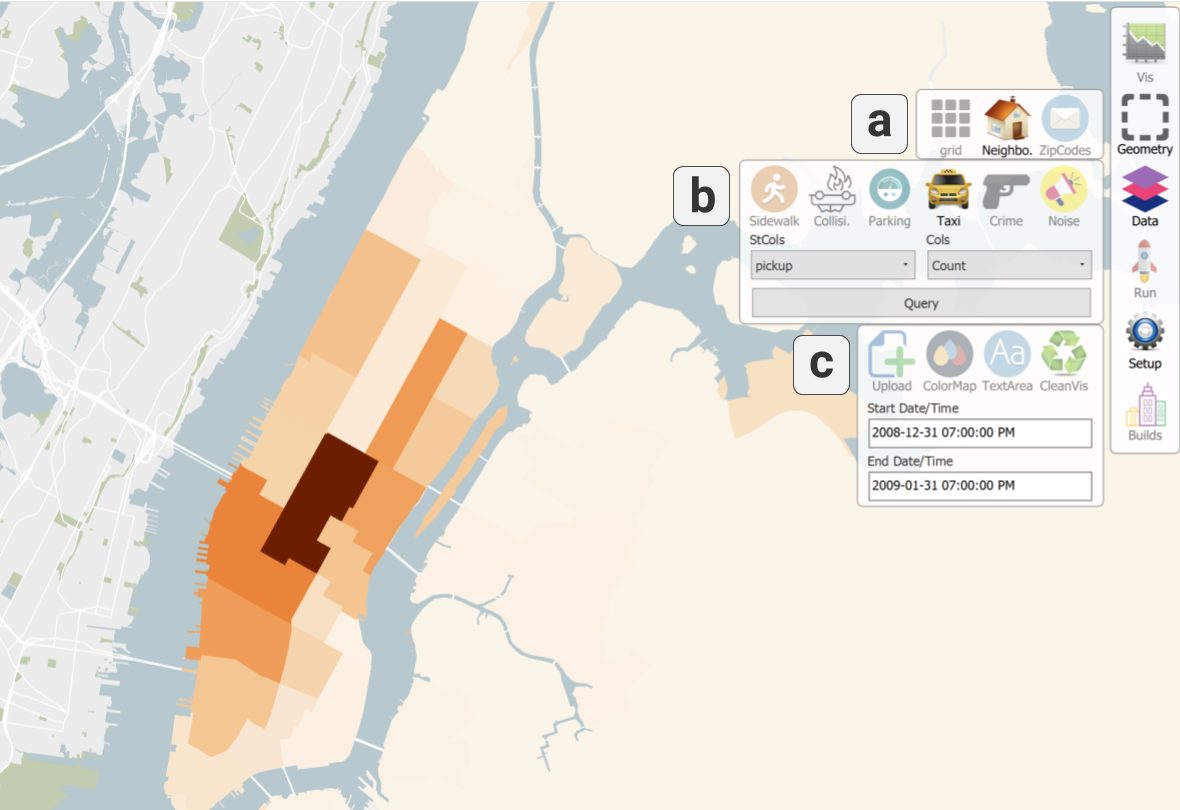Collaborative Research: Frameworks: Cyberinfrastructure to Catalyze and Sustain the Urban Computing Community
September 1st, 2024 - August 31st, 2029
Categories: Applications, User Groups, Visualization, Visual Analytics, Data Science, Urban Data Visualization

About
Project Overview
Cities are the loci of resource consumption, economic activity, and innovation; they are where our looming sustainability problems were born and where those problems must be solved. Given our increasing ability to collect, transmit, store, and analyze data, we have the opportunity to go beyond today’s imperfect and often anecdotal understanding of cities to enable better operations, better planning, and better policy. To understand cities, we must analyze the data exhaust from their components - infrastructure, environment, and people - and how they interact over space and time. While there are already troves of open data about cities, their potential remains largely untapped due to unique challenges related to diversity, scale, and complexity of both urban data and computations required to obtain insights from these data. In this project, we aim to democratize data-driven and data-intensive approaches in urban computing to empower a broad range of stakeholders to analyze urban data at scale and tackle problems from different domains, including transportation, accessibility, and disaster management. We will address two critical obstacles to greater progress in urban computing: the lack of documented, robust, well-engineered tools and open computing platforms, and a dispersed community of researchers and developers. At the core of our proposal is the development of a cyberinfrastructure that integrates methods and tools for the exploration of urban data that are scalable, reusable, interoperable, and offer solutions to common challenges, including data cleaning, management, and visualization. We will deploy an integrated suite of tools in a collaborative cloud environment, enabling users from different domains to easily reuse existing methods across domains to ensure sustainability, facilitate collaboration between researchers and developers, and develop a cohesive community.
Keywords: urban data, urban science, big data
Intellectual Merit
We will develop a software infrastructure to address a wide range of urban computing challenges by integrating and extending existing open-source tools as well as translating academic research products. We will also deploy a cloud-based, open collaborative environment that will support the use of this infrastructure over large and diverse urban data sets (e.g., spatiotemporal, geometry, image). The intellectual merit of the proposed effort lies within the novelty of the tools and techniques it will produce, as well as in the software engineering challenges involved in developing, maintaining and supporting code that will be deployed and widely adopted.
Broader Impacts
This project will contribute to the creation of a sustainable environment of urban software and tools, readily available for researchers to use and extend. The proposed infrastructure aims to propel urban computing into the open-source and open-science movement, making urban computing research more tractable, replicable/reproducible, and impactful, and delivering immediate benefit to a broad range of disciplines, including urban planning, urban design, transportation, GIS, data science, and human behavior studies. It will reduce barriers to entry for newcomers to urban computing, through intuitive interfaces, easy access to data, and participation in an active community. This project will contribute to education in computer science and urban computing-related areas through new graduate-level curricula to educate the next generation of urban scientists about computing, and expose computer and data scientists to urban-related problems. We will lead collaborative projects, seminars, and workshops to incentivize the creation of deeper connections across urban computing-related areas. We will release all software produced using a permissive open-source license to afford dissemination, commercialization, and incorporation into other software packages. We will actively contribute to our open-source projects to build community and ensure sustainability. The PIs of this project have a proven record of releasing data, widely used tools, and frameworks that are distributed as open source.